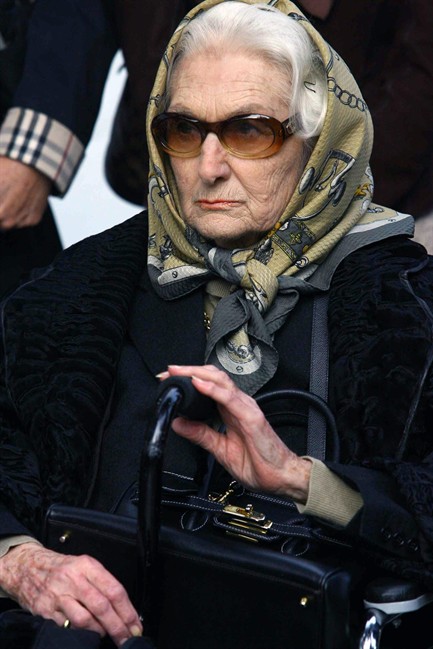Neslisah Sultan, twice-exiled former Ottoman princess, dies
Advertisement
Read this article for free:
or
Already have an account? Log in here »
To continue reading, please subscribe:
Monthly Digital Subscription
$1 per week for 24 weeks*
- Enjoy unlimited reading on winnipegfreepress.com
- Read the E-Edition, our digital replica newspaper
- Access News Break, our award-winning app
- Play interactive puzzles
*Billed as $4.00 plus GST every four weeks. After 24 weeks, price increases to the regular rate of $19.00 plus GST every four weeks. Offer available to new and qualified returning subscribers only. Cancel any time.
Monthly Digital Subscription
$4.75/week*
- Enjoy unlimited reading on winnipegfreepress.com
- Read the E-Edition, our digital replica newspaper
- Access News Break, our award-winning app
- Play interactive puzzles
*Billed as $19 plus GST every four weeks. Cancel any time.
To continue reading, please subscribe:
Add Free Press access to your Brandon Sun subscription for only an additional
$1 for the first 4 weeks*
*Your next subscription payment will increase by $1.00 and you will be charged $16.99 plus GST for four weeks. After four weeks, your payment will increase to $23.99 plus GST every four weeks.
Read unlimited articles for free today:
or
Already have an account? Log in here »
Hey there, time traveller!
This article was published 03/04/2012 (4946 days ago), so information in it may no longer be current.
ANKARA, Turkey – Neslisah Osmanoglu, an Ottoman princess who married an Egyptian prince and was twice forced into exile when both royal households were abolished, has died. She was 91.
Neslisah Sultan, or Princess Neslisah, died in Istanbul on Monday, according to her nephew, Abdulhamid Kayihan Osmanoglu. He didn’t give the cause of death, but new reports said it was a heart attack. A funeral ceremony was being held Tuesday for the princess, who was the oldest member of the Ottoman dynasty.
Neslisah Sultan was born in Istanbul on Feb. 4, 1921, two years before the Turkish Republic replaced the Ottoman Empire, which had ruled Turkey, parts of the Middle East and eastern Europe for 600 years.

Her grandfather, the last Ottoman Sultan Vahdettin, and all other members of the dynasty were sent into exile in 1924, and the princess spent her childhood and adolescence in Nice, France, before moving to Egypt.
“When we were in exile we lived longing for the country,” she told historian Murat Bardakci, whose biography of the princess was published last year. “My mother had friends who would go to Istanbul. I would ask them to bring me back a bit of soil from Istanbul, but none did.”
Ottoman princesses were traditionally married to members of Muslim royal families, and in 1940, Neslihan Sultan married Egyptian Prince Muhammed Abdel Monem. Prince Monem headed a regency committee that ruled from July 1952 to June 1953, when the new rulers of Egypt turned the country into a republic.
The royal couple were placed under house arrest, accused of being part of an international plot against the Egyptian government of Gamal Abdel Nasser, but acquitted and forced to leave the country.
Exiled for a second time, Neslisah Sultan returned to live in France with her husband.
In 1952, the Turkish government allowed female members of the Ottoman family to return to Turkey, and the prince and princess moved to Istanbul in 1957.
On Tuesday, Prime Minister Recep Tayyip Erdogan praised the late princess.
“She was the poster-child for nobleness who carried the blood of Osman,” he said in Parliament, referring to Osman I, the Anatolian ruler who established the Ottoman Empire. “We remember her with high regard and our blessings.”
The princess took the surname Osmanoglu, or son of Osman, along with other surviving members of the dynasty.
“When I go out in the streets, I see that all nice things were built by my grandfathers,” she told Bardakci. “I therefore cannot help think that they belong to me. I feel like I am a part of this place and that I belong to this land.”
Prince Monem, who was born in 1899, died in Istanbul in 1979.
Neslisah Sultan is survived by a son, daughter and a grandson.
__
Associated Press writer Maamoun Youssef in Cairo contributed.

